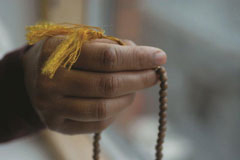
Supporting the Council for At-Risk Academics
4 March 2013
Eighty years on, a British charity originally set up to support academic refugees from Nazi Germany is still in business, helping desperate people from all around the world, and making a real difference to hundreds of lives.
By Stephen Wordsworth, Executive Director of CARA (The Council for At-Risk Academics).
Life can be tough for academics in the UK. Too little money, too little job security. Unfortunately, for some academics abroad, it can be a lot tougher, when they fall out of favour with their ruling regimes, or with local extremist groups. Such people don't like being criticised by independently-minded academics. By people like H, whose brother was murdered, and who was then himself injured in an attack on his office which left two of his colleagues dead. Like P, a political activist, whose family was targeted by the authorities. Like M, who was told to sign a legal document agreeing not to express his faith in any form, and was fired and harassed when he refused. Or like H, who was sent a 'last warning' message and a bullet by extremists for refusing to wear a head scarf at her university.
![]() Z (Iran)
Z (Iran)
Z spoke out against corruption. She received death threats, and was forced to leave Iran with her husband and children. CARA supported her to complete a PhD in Engineering.
CARA (the Council for At-Risk Academics) has been in business now for nearly 80 years, and our files are full of cases like these.
We were set up in 1933 as the brainchild of the leading British academics and scientists of the day, in response to the Nazi crackdown on the universities and especially on Jewish academics. The official British government view at the time of was often not constructive. 'Refugee', then as now, was not a popular word with politicians. Even within the academic community there was some opposition, based on fears that the 'foreigners' would take over British jobs.
 But our founders - Beveridge, Rutherford, J M Keynes, the vice chancellors of many universities, the Presidents of The Royal Society and The British Academy, among others - gave a strong lead. Albert Einstein gave a fundraising address at the Albert Hall. The Home Office was persuaded to issue visas. And there were many individual acts of kindness. So hundreds of desperate people could be saved, and be found new places to pursue their careers. Sixteen of them went on to win Nobel Prizes. Eighteen were knighted for their achievements, including Sir Ludwig Guttmann, the 'father' of the Paralympics. Overall, their contribution to British academic and scientific life, to British medicine, and to the world was enormous.
But our founders - Beveridge, Rutherford, J M Keynes, the vice chancellors of many universities, the Presidents of The Royal Society and The British Academy, among others - gave a strong lead. Albert Einstein gave a fundraising address at the Albert Hall. The Home Office was persuaded to issue visas. And there were many individual acts of kindness. So hundreds of desperate people could be saved, and be found new places to pursue their careers. Sixteen of them went on to win Nobel Prizes. Eighteen were knighted for their achievements, including Sir Ludwig Guttmann, the 'father' of the Paralympics. Overall, their contribution to British academic and scientific life, to British medicine, and to the world was enormous.
![]() G (Zimbabwe)
G (Zimbabwe)
As secretary general of his university union, G advocated staff rights, thereby antagonising the university authorities who were closely linked to Mugabe's ruling party. He was forced to self-censor his lectures when he realised that intelligence officers were masquerading as students in his classes. He fled to the UK, and was supported by CARA to do a PhD.
Our founders, great men and women though they were, thought that an organisation like ours would be needed for only a few years. Sadly, they were wrong. After the Second World War, Stalinist repression led to a new wave of exiles from eastern Europe. Later, it was apartheid in South Africa, the suppression of democracy in Pinochet's Chile, and many other conflicts and acts of arbitrary rule around the world. The suffering, violence and torture continued. Too often, intelligent, free-minded people, trying to uphold basic principles of academic freedom, were in the firing line - sometimes literally.
So CARA stayed in business, to offer a helping hand to those who come to us, from all over the world. Many of them arrive disoriented, confused, traumatised. We provide advice and emergency support, for them and their families; and with the backing of a network of 75 UK universities, we have been able to help many of them to begin rebuilding their lives in safety. Some have no choice but to start new lives here. Others, after a respite, bravely choose to go back to try to change things for the better in their home countries.
![]() H (Iraq)
H (Iraq)
H was a Lecturer in Mechanical Engineering in Baghdad. Her career was interrupted by the looting of her department in 2003, and by sustained militia attacks in the following years. She came to the UK and, with CARA's support, secured a post-doctoral placement. She has since returned to Iraq and is lecturing at university there.
In recent years we have also launched programmes for Iraq and Zimbabwe, providing direct support to academics who are under great pressure but nevertheless want to stay, if they can. In some cases they may just need basic equipment, to keep open a faculty which a highly politicised system has starved of supplies. Or it can be more. For Iraq, with outstanding support from many UK academics, we set up an active fellowship programme and a series of regional round table discussions. These have provided opportunities for Iraqi academics to undertake joint research projects with counterparts in the UK and elsewhere, to come here for study visits, and to keep in touch with the latest developments in their field. In Zimbabwe we have helped establish a virtual lecture hall, so that Zimbabwean academics abroad, and others, including from the UK, can beam lectures back, to support those who have stayed. For those who are under severe daily pressure, such contacts, and the practical and moral support they provide, can mean all the difference between being able to stay on and serve their students and universities or having to uproot, and seek a new life abroad with their families, with no money and very uncertain prospects.
 And right now we are working with Universities UK and others to try to help Syrian students and academics who are trapped here by the conflict in their home country. The specific needs change, but our task remains the same: in the words of our Founding Statement from 1933, 'to prevent the waste of exceptional abilities exceptionally trained'.
And right now we are working with Universities UK and others to try to help Syrian students and academics who are trapped here by the conflict in their home country. The specific needs change, but our task remains the same: in the words of our Founding Statement from 1933, 'to prevent the waste of exceptional abilities exceptionally trained'.
![]() Assistant Dean, Zimbabwe
Assistant Dean, Zimbabwe
'The Faculty was facing severe challenges in teaching vital programmes... the CARA grant has substantially remedied this situation and the quality of teaching has already improved remarkably, along with an increase in applications for our masters in public health next year; something I never thought would happen!'
Albie Sachs, who uniquely sought CARA's help twice, in 1966 and 1988, after suffering severe injury at the hands of the apartheid regime in South Africa, and who later served for 15 years on the Constitutional Court of South Africa in Nelson Mandela's time, recently described his experience of CARA's support in the following terms: 'My story has been repeated a thousand times and more, with different details but the same theme... an intellectual driven from his or her homeland by repression and intolerance... enabled to share ideas and values with welcoming hosts, improving skills, entering into dialogue with people from all over the world ... through living the principles of free enquiry in different lands we end up becoming natural apostles of peace and understanding and of internationalism at its best.'
This costs money, and we need your support. Not a lot: we know times are hard. But if enough people gave us a direct debit of just £10 per year, it would make a real difference to our work. Please take five minutes to take a look at the 'Make a donation' page on our website - www.cara.ngo.
Thank you.
- PrintPrint this page
- Share



Comments